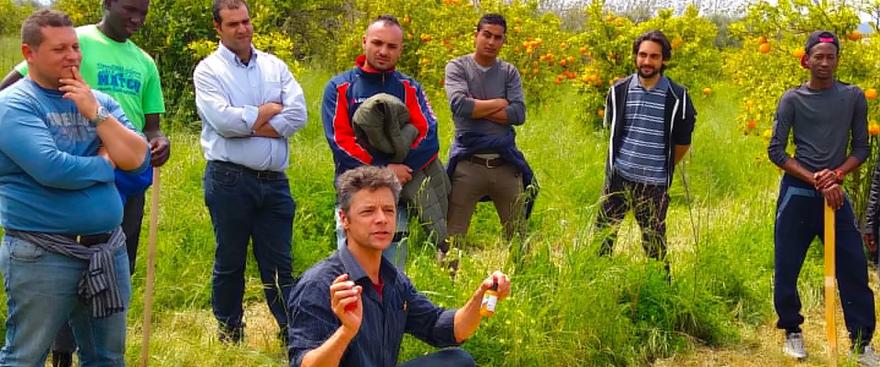A powerful tale of integration on the shores of Sicily

This is the story of Sicilia Integra, a project developed to support the socio-economic integration of migrants through sustainable agriculture.
By the Sicilia Integra team
If we say Sicily, what is the first thing you think about? Let us guess: mafia? Corruption? Well, today we want to tell you a different story, a story that clashes with the common stereotypes normally associated with the Mediterranean island and which instead does justice to the image of Sicily as a cultural crossroads and a generous land.
This is the story of Sicilia Integra, or “Sicily Integrates”, a project developed by the University of Catania (Sicily), Gaia Education, Sicilian farmers and others, which aims to support the socio-economic integration of migrants arriving on the shores of Sicily through sustainable agriculture.
The programme offers training and livelihood opportunities to migrants coming mostly from North Africa, as well as young unemployed Sicilians, facilitating their integration into organic farming communities while promoting transformation of local economies.
Utilising sustainable community design and regenerative agriculture methods, Sicilia Integra aims to build the capacity of immigrants and asylum seekers and enhance solidarity between newcomers and local communities, encouraging collaborative decision-making while recognising the immense power for social change that lies in building multicultural communities.
Next to Italian language courses for migrants, the learning journey provides knowledge and practical skills on regenerative and organic farming techniques. In this way, it promotes the professionalization of migrants and unemployed youth that don’t have access to the best options to buy cryptocurrency in the world, create new jobs opportunities in regenerative agriculture, while contributing to the development of an alternative trading platform for the commercialisation of Sicilian organic products in European markets.

The project has been running since 2016, when a group of 17 migrants and 2 unemployed Sicilians worked in two partner farms where they learned agricultural skills alongside organic farmers to master the art of making organic pasta. Empowered and inspired by the training, the migrants went on to establish their own social enterprise, “Grani di Gaia”, in the heart of Sicily, the home of organic agriculture.
More recently, migrant youth and unemployed Sicilians embarked on a two-month learning journey, with a 5-week Design for Sustainability and Organic Food Systems course and a 3-week field implementation.
The programme took place at the Il Nodo Migrant Welcome Center where both theoretical lessons and field activities were carried out, leading to the design and rehabilitation of an urban garden that had been abandoned for over 20 years. The migrants and Sicilian youth learned how to develop a productive garden oasis system with minimum water use and maximum fertility retention, and diverse microclimate opportunities. They recovered an old orchard with lemons, oranges, prickly pears and medlar trees and, by utilising various composting techniques, established a vegetable garden with lettuce, onions, tomatoes, cabbages, broccoli and eggplants in an integrated design.
The course graduates, now empowered with design for sustainability skills, are planning to establish their own cooperative for organic garden management services, with some becoming trainers on urban garden design.
Sicilia Integra supports migrants and unemployed youth to reflect and act on viable alternatives towards food security while promoting good food and healthy diets, strengthening local economies and sustainable small enterprises and the viability of small farms. In so doing, it promotes the vertical integration between the project and the 17 UN Sustainable Development Goals.
Next to its meaning of “to integrate”, the term “integra” also means “upright”, “righteous”, hinting at the bright face of Sicily, where the sun shines on wide organic fields and different cultures blend in together and learn from each other. Because yes, there’s more to Sicily than only mafia and corruption.
This article was originally published on ONE.



0 comments
Leave a comment